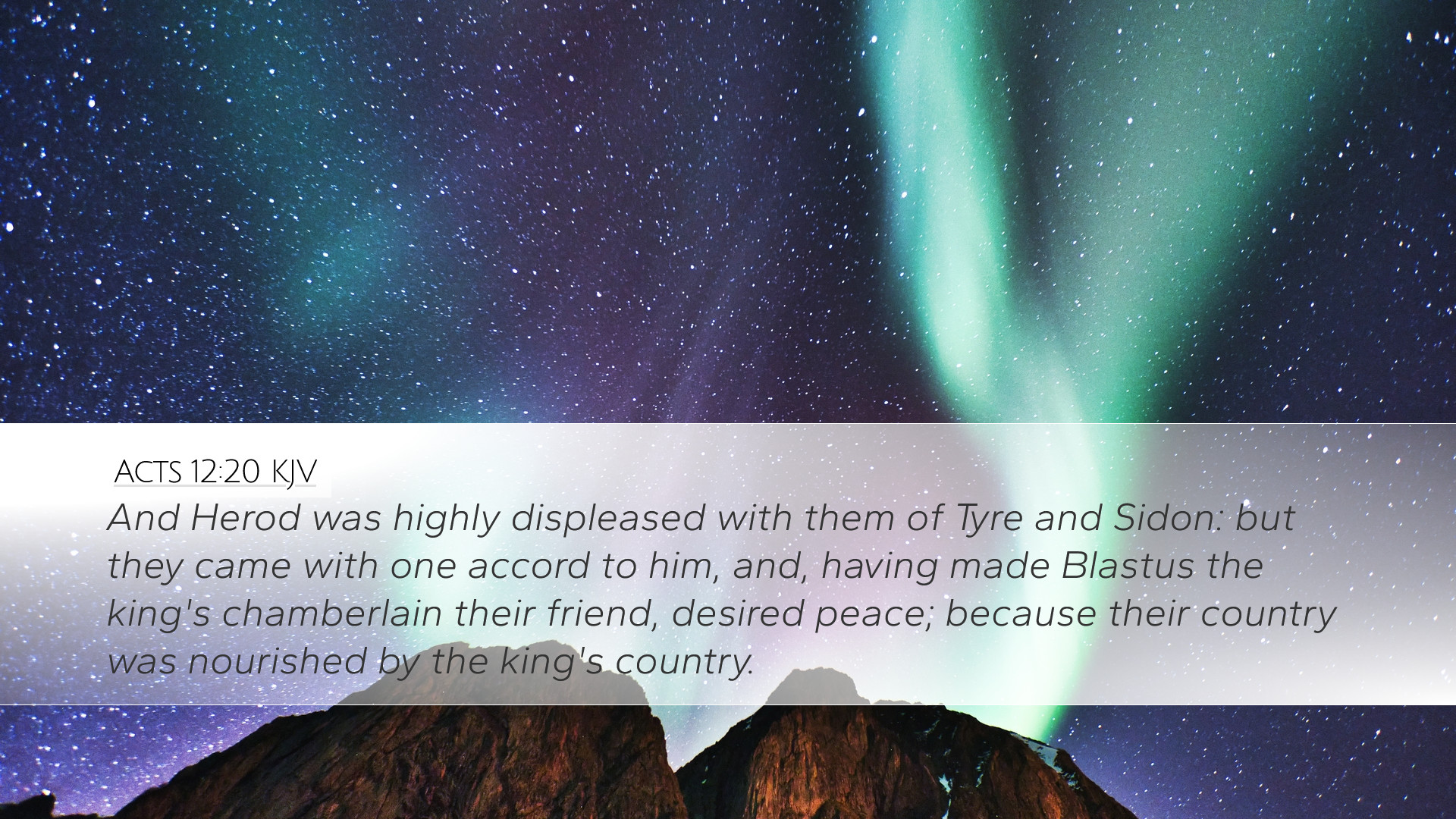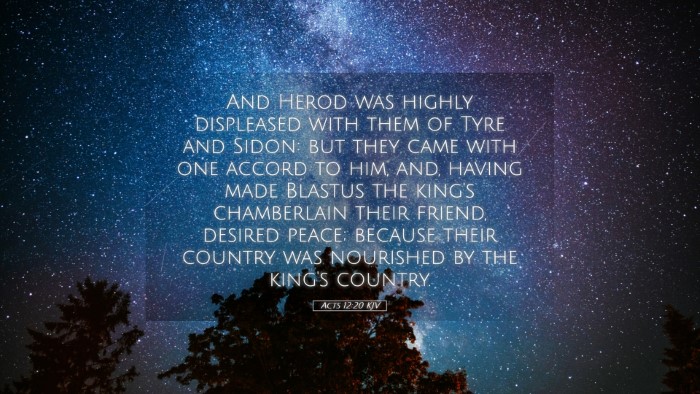Old Testament
Genesis Exodus Leviticus Numbers Deuteronomy Joshua Judges Ruth 1 Samuel 2 Samuel 1 Kings 2 Kings 1 Chronicles 2 Chronicles Ezra Nehemiah Esther Job Psalms Proverbs Ecclesiastes Song of Solomon Isaiah Jeremiah Lamentations Ezekiel Daniel Hosea Joel Amos Obadiah Jonah Micah Nahum Habakkuk Zephaniah Haggai Zechariah MalachiActs 12:20
Acts 12:20 KJV
And Herod was highly displeased with them of Tyre and Sidon: but they came with one accord to him, and, having made Blastus the king's chamberlain their friend, desired peace; because their country was nourished by the king's country.
Acts 12:20 Bible Commentary
Commentary on Acts 12:20
Text of Acts 12:20 (KJV): "And Herod was highly displeased with them of Tyre and Sidon: but they came with one accord to him, and, having made Blastus the king's chamberlain their friend, desired peace; because their country was nourished by the king’s country."
Introduction
The account in Acts 12:20 presents a pivotal moment in the life of King Herod and the regions of Tyre and Sidon. This verse encapsulates the interpersonal dynamics of power, manipulation, and diplomacy. Furthermore, it serves as a narrative pivot that characterizes the political landscape surrounding the early Christian Church.
Exegesis and Analysis
Historical Context: The interaction between Herod and the cities of Tyre and Sidon is set against a backdrop of political tension. Herod Agrippa I was known for his fluctuating relationships with various regions and people in Palestine. Matthew Henry notes that these cities were dependent on Herod’s territory for their sustenance, highlighting the political leverage Herod held.
Character of Herod: Herod’s displeasure with Tyre and Sidon underscores a ruler's inclination to respond to challenges with anger and authority. Albert Barnes emphasizes that anger can lead to severe consequences, especially in regimes where power dynamics are manipulative. Herod’s authority was derived not solely from lineage but also from his capacity to maintain order, at times through intimidation.
The Role of Blastus
The mention of Blastus, Herod's chamberlain, signals an important relational element in the art of political negotiations. Adam Clarke notes that the role of a chamberlain involved immense influence since they served as intermediaries between the king and the populace. The dependence of Tyre and Sidon on Blastus for favor underscores the importance of personal relationships in political machinations.
Thematic Elements
- Power and Influence: The dynamics between Herod and the representatives from Tyre and Sidon illustrate the themes of power, diplomacy, and dependence. The term "highly displeased" indicates a conflict that could be politically damaging if not resolved.
- Manipulation and Diplomacy: The phrase "they came with one accord" signifies a united front in the face of possible wrath. Commentators highlight the necessity of solidarity among the delegates, resulting from their immediate need for peace with a volatile ruler.
- Dependency and Provision: The motivations behind seeking peace were not merely diplomatic; they were existential. The phrase "because their country was nourished by the king’s country" underscores a profound dependency that often characterizes political relationships.
Theological Reflections
This passage also presents reflections on divine providence and human agency. While the political maneuvering is evident, it serves as a reminder of God’s sovereignty amidst human affairs. Matthew Henry suggests that despite the actions of rulers like Herod, God's purposes prevail. This reflects the larger narrative arc found throughout the Book of Acts, where human opposition often leads to the advancement of the Gospel.
Application for Readers
The lessons drawn from Acts 12:20 extend beyond the historical and political realms. For pastors, students, and theologians, there are several applications to consider:
- Understanding Power Dynamics: Reflect on the power structures in your own contexts and the ethical implications of influence. How do personal relationships affect your ministry or community engagements?
- The Call for Unity: The cooperation of the delegates from Tyre and Sidon can be a testament to the necessity of unity among believers. In facing societal challenges, solidarity is essential.
- Trusting God’s Sovereignty: Despite turbulent political climates, believers are reminded to stay faithful, trusting that God’s agenda will ultimately prevail, as illustrated throughout the Acts narrative.
Conclusion
Acts 12:20 serves as a microcosm of larger themes of authority, relational dynamics, and divine oversight. By studying this verse through various commentaries, we glean not only historical insights but also spiritual applications that remain pertinent for modern believers and leaders alike. As we delve deeper into the implications of this passage, we recognize the powerful blend of human agency and divine governance at play within the biblical narrative.


